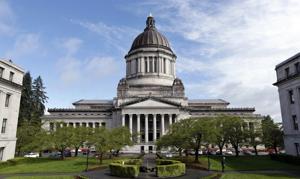Washington state ranked 39th for economic competitiveness

(The Center Square) – A free market organization’s latest ranking of economic competitiveness and outlook for U.S. states places Washington state just outside the bottom 10 states.
In the American Legislative Exchange Council’s (ALEC) 15th edition of “Rich States, Poor States,” Washington ranked 39th in the country. The report ranks states based on a variety of factors, including tax burden, size of government, role of labor unions, and public debt.
“The Economic Outlook Ranking is a forecast based on a state’s current standing in 15 state policy variables,” the report states. “Each of these factors is influenced directly by state lawmakers through the legislative process. Generally speaking, states that spend less – especially on income transfer programs – and states that tax less – particularly on productive activities such as working or investing – experience higher growth rates than states that tax and spend more.”
It’s a tale of two Washingtons in the report. The Evergreen State ranks at or near the top in several categories, while also ranking at or near the bottom in others.
For example, ALEC ranked Washington No. 1 in the top marginal personal income tax rate category.
State law prohibits income taxes in Washington. A bill proposed during this year’s legislative session, Senate Bill 5554, would have allowed local governments to create income taxes, but only to make up for a funding gap after cutting taxes like the sales tax or property tax. The bill died in committee.
Washington was ranked No. 2 in personal income tax progressivity – that is, the change in tax liability per $1,000 of income.
Washington came in at No. 3 in tax expenditure limits category that measures the influence of tax and expenditure limits on state revenue and spending.
State expenditures are restricted to available revenues and governed by balanced budget requirements enacted by the Legislature in 2012 and in effect since the 2013-2015 biennium.
The state operating budget must be balanced for the current two-year fiscal period, based on current estimates for state revenues and the projected cost of maintaining the current level of state programs and services.
Together, these two requirements are referred to as the “budget outlook” or the “four-year balanced budget.”
Washington was ranked 50th in two categories: for levying an estate/inheritance tax, and for not being a right-to-work state.
The state’s $14.49 per hour minimum wage was ranked nearly the worst in the nation, coming in at No. 49.
Washington fared better in ALEC’s Economic Performance Ranking, described in the report as “a backward-looking measure based on a state’s performance on three important variables: State Gross Domestic Product, Absolute Domestic Migration and Non-Farm Payroll Employment – all of which are highly influenced by state policy. This ranking details states’ individual performances over the past 10 years based on this economic data.”
By that criteria, Washington came in at No. 5. Only Arizona, Utah, Florida, and Idaho did better.
Disclaimer: This content is distributed by The Center Square
